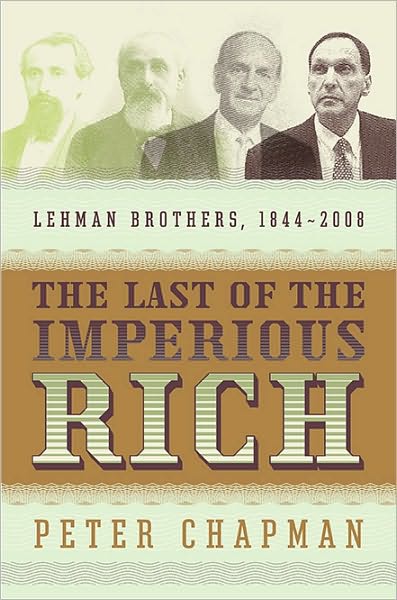This is a great book for those that love economic history, as I do.? It describes the fortunes of the Lehman clan, Jews having emigrated from Germany, to antebellum Montgomery, Alabama, and later New York City, and what they did as a commodity trading firm that morphed into venture capital, and then investment banking.
As a family firm, it lasted for three-four generations.? There was less than one generation as a private company outside of family control.? Stagnation, and a need to allow for liquidity led to a need for a broader capital base, which led to the sale to American Express.
The title stems from the life of Bobbie Lehman, who was the last family member to lead the company, who as a financier, had such a commanding position that he struck fear in the hearts of those he would talk to, though he was a gentleman in many regards, and a patron of the arts to a high degree.
History is Messy
How did three immigrant brothers manage to create a behemoth, particularly with the original leader dying early?? Hard work; they were in the right places at the right times.? Their family structures held together well enough against increasing wealth, at least until the third generation.
They were pragmatic, and sometimes cut against their principles.? There is some evidence that the brother bought at least one slave.
The commodities that they traded in were in hot demand.? They built that into a big business.? That they had a presence both in the agricultural areas for commodities, and in the financial capital, New York City, was an ideal plan to have information from both sides of the market, supply and demand.
But the messiness of history is what makes this an interesting tale, and the author tells it well.
Quibbles
It’s a really good book.? I think it is best paired with A Colossal Failure of Common Sense: The Inside Story of the Collapse of Lehman Brothers, because it tells the end of the story better.? But the beginning of the story is rich, and had a few alternative decisions been made, Lehman might not have failed.
Who would benefit from this book:
I think most investors could benefit from the book, mainly because I believe that economic history is valuable.? History doesn’t repeat but it rhymes, and this gives us more than a few new poems to consider.
If you want to, you can buy it here: The Last of the Imperious Rich: Lehman Brothers, 1844-2008.
Full disclosure: This book was sent to me, and I don’t think I asked for it.? I’m? glad they sent it, though.
If you enter Amazon through my site, and you buy anything, I get a small commission.? This is my main source of blog revenue.? I prefer this to a ?tip jar? because I want you to get something you want, rather than merely giving me a tip.? Book reviews take time, particularly with the reading, which most book reviewers don?t do in full, and I typically do. (When I don?t, I mention that I scanned the book.? Also, I never use the data that the PR flacks send out.)
Most people buying at Amazon do not enter via a referring website.? Thus Amazon builds an extra 1-3% into the prices to all buyers to compensate for the commissions given to the minority that come through referring sites.? Whether you buy at Amazon directly or enter via my site, your prices don?t change.


David; great work on this; I promise to get through your web link! As an addendum to very helpful economic history books; i really enjoyed these and our correspondence inspired some of these choices.
1. Annoted version Reminiscences of a Stock Market Operator; editor Jon Markman made this a great historical reference book. This is worth getting as you can use it as a reference to learn more about the great financiers of the 19th and early 20th century.
2. THe CRash of 1929 by John Kenneth Galbraith
3. The Forgotten Man by Amity Shlaes
4. The Panic of 1907
5. Lords of Finance by Liaquat Ahamed
6. House of Morgan and Rockefeller; both by Ron Chernow
7. 50 years in Wall Street by Henry Clews
8. Bernard Baruch by James Grant
9. Buffet; The Making of a an American Capitalist by Roger Lowenstein
10. For the really smart people (David); Alan Meltzer’s “History of the Federal Reserve Part 1” and MIlton Friedman’s/Anna Schwartz’ “Monetary History of the United States 1867-1960” will make you lok at capital markets differently. Consider these lifetime projects; Lords of Finance will help with these and much more reader friendly.
11. Niall ferguson’s “Ascent of Money”; he’s a great writer and I found the book a useful reference book. David’s reveiwed before “THe History of the Rothschilds”; a big project but much wisdom is within the pages.